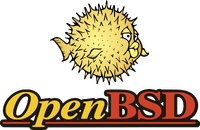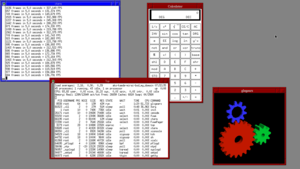More actions
Electron271 (talk | contribs) m (Chore: Update categories) |
m (Updated citations) |
||
| (4 intermediate revisions by 2 users not shown) | |||
| Line 1: | Line 1: | ||
{{DistributionInfobox|architectures=alpha, armish, aviion, hppa, i386, landisk, loongson, luna88k, octeon, powerpc, powerpc64, risc64, sgi, socppc, sparc, sparc64, x86_64, zaurus|caption=The OpenBSD logo|defaultdesktops=[[FVWM]], [[AfterStep]], [[ | {{DistributionInfobox|architectures=alpha, armish, aviion, hppa, i386, landisk, loongson, luna88k, octeon, powerpc, powerpc64, risc64, sgi, socppc, sparc, sparc64, x86_64, zaurus|caption=The OpenBSD logo|defaultdesktops=[[FVWM]], [[AfterStep]], [[AwesomeWM]], [[Blackbox]], [[Enlightenment]], [[Fluxbox]], [[GNOME]], [[IceWM]], [[KDE Plasma]], [[Openbox]], [[Window Maker]], [[Xfce]]|image=[[File:OpenBSD logo.png|200px|OpenBSD_logo]]|packagemanager=pkg_*|releasemodel=Stable|releasestatus=Maintained|title=OpenBSD|usagetype=Security, Server|website=[https://openbsd.org openbsd.org]}} | ||
OpenBSD is a Unix operating system, based on the [[BSD|BSD (Berkley Software Distribution)]], developed by Theo de Raadt since 1995. | OpenBSD is a Unix [[Operating System|operating system]], based on the [[BSD|BSD (Berkley Software Distribution)]], developed by Theo de Raadt since 1995. The first version of OpenBSD (1.2) released on July 1996.<ref name=":0">De Raadt, Theo (18 October 1996). [http://wolfram.schneider.org/bsd/ftp/releases/OpenBSD-2.0 "The OpenBSD 2.0 release"]. ''openbsd-announce'' (Mailing list).</ref> | ||
[[File:OpenBSD 7.0 fvwm screenshot.png|alt=OpenBSD 7.0 running on the default desktop (FVWM).|thumb|OpenBSD 7.0 running on the default desktop (FVWM).]] | [[File:OpenBSD 7.0 fvwm screenshot.png|alt=OpenBSD 7.0 running on the default desktop (FVWM).|thumb|OpenBSD 7.0 running on the default desktop (FVWM).]] | ||
The OpenBSD project produces a free, multi-platform BSD 4.4-based Unix operating system. Its efforts emphasize portability, standardisation, correctness, proactive security and integrated cryptography. The project also develops the widely-used and popular [[OpenSSH]] (OpenBSD Secure Shell) software, which provides encrypted communication sessions over a computer network using the SSH protocol.<ref>[https://distrowatch.com/table.php?distribution=OpenBSD DistroWatch.com | The OpenBSD project produces a free, multi-platform BSD 4.4-based Unix operating system. Its efforts emphasize portability, standardisation, correctness, proactive security and integrated cryptography. The project also develops the widely-used and popular [[OpenSSH]] (OpenBSD Secure Shell) software, which provides encrypted communication sessions over a computer network using the [[SSH]] protocol.<ref>[https://distrowatch.com/table.php?distribution=OpenBSD "OpenBSD"]. DistroWatch.com.</ref> | ||
Many open source projects widely used in other operating systems started off as components of OpenBSD, such as [[doas]], a safer replacement of the popular [[sudo]], the aforementioned OpenSSH and [[Xenocara]], a customized [[ | Many open source projects widely used in other operating systems started off as components of OpenBSD, such as [[doas]], a safer replacement of the popular [[sudo]], the aforementioned OpenSSH and [[Xenocara]], a customized [[XOrg]] build infrastructure.<ref>[https://xenocara.org/ "About Xenocara"]. ''Xenocara''.</ref> | ||
Like all BSD operating systems, OpenBSD provides a kernel, drivers, userland utilities and documentation unlike [[Linux]], which provides just the kernel and drivers, relying on third-parties such as [[GNU]]. | Like all BSD operating systems, OpenBSD provides a kernel, drivers, userland utilities and documentation unlike [[Linux]], which provides just the kernel and drivers, relying on third-parties such as [[GNU]]. | ||
<references /> | <references /> | ||
[[Category:Misc Operating Systems]] | [[Category:Misc Operating Systems]] | ||
Latest revision as of 16:43, 18 November 2024
 The OpenBSD logo | |
| Release Status | Maintained |
|---|---|
| Release Model | Stable |
| Package Manager | pkg_* |
| Default Desktops | FVWM, AfterStep, AwesomeWM, Blackbox, Enlightenment, Fluxbox, GNOME, IceWM, KDE Plasma, Openbox, Window Maker, Xfce |
| Usage Type | Security, Server |
| Architectures | alpha, armish, aviion, hppa, i386, landisk, loongson, luna88k, octeon, powerpc, powerpc64, risc64, sgi, socppc, sparc, sparc64, x86_64, zaurus |
| Website | openbsd.org |
OpenBSD is a Unix operating system, based on the BSD (Berkley Software Distribution), developed by Theo de Raadt since 1995. The first version of OpenBSD (1.2) released on July 1996.[1]

The OpenBSD project produces a free, multi-platform BSD 4.4-based Unix operating system. Its efforts emphasize portability, standardisation, correctness, proactive security and integrated cryptography. The project also develops the widely-used and popular OpenSSH (OpenBSD Secure Shell) software, which provides encrypted communication sessions over a computer network using the SSH protocol.[2]
Many open source projects widely used in other operating systems started off as components of OpenBSD, such as doas, a safer replacement of the popular sudo, the aforementioned OpenSSH and Xenocara, a customized XOrg build infrastructure.[3]
Like all BSD operating systems, OpenBSD provides a kernel, drivers, userland utilities and documentation unlike Linux, which provides just the kernel and drivers, relying on third-parties such as GNU.
- ↑ De Raadt, Theo (18 October 1996). "The OpenBSD 2.0 release". openbsd-announce (Mailing list).
- ↑ "OpenBSD". DistroWatch.com.
- ↑ "About Xenocara". Xenocara.
